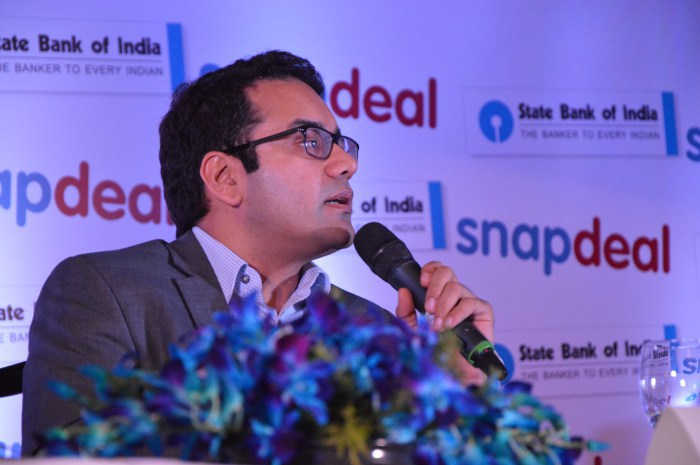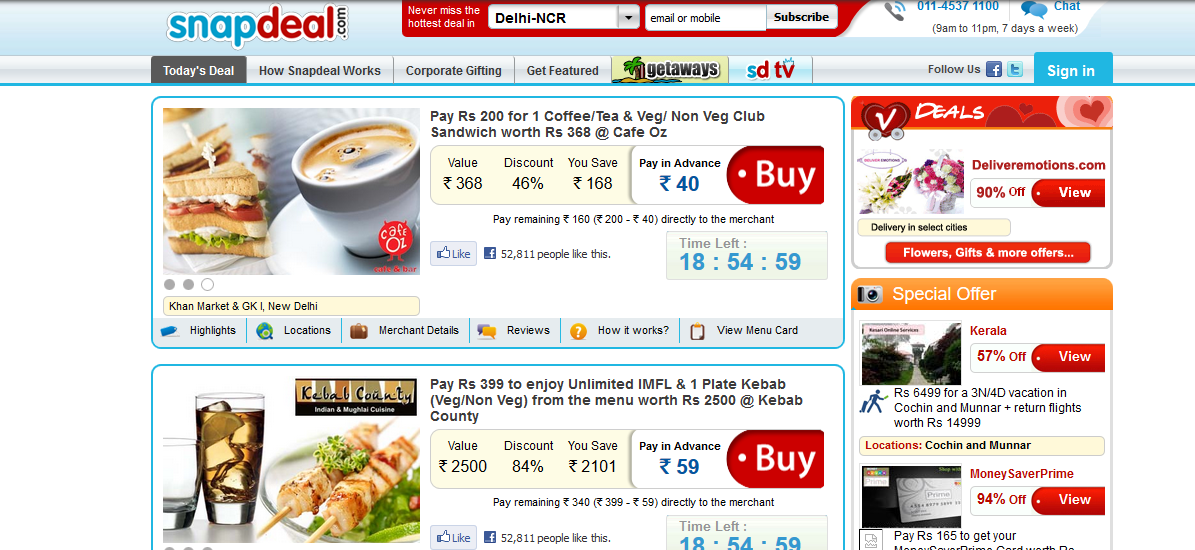Two best friends having common interest in food and maths from Delhi Public School started an offline coupons business which later turned into one of the biggest eCommerce companies of India. The CEO Kunal Bahl (alumni Wharton School, US) and COO Rohit Bansal (IIT Delhi alumni) joined hands to create Snapdeal.

Back in 2007 when Kunak Bahl’s US visa got rejected and was asked to return to India, he along with Rohit Bansal who was working for CapitalOne in India, decided to work together and do something different. Kunal while studying in US did 3 different jobs to make up for his monthly expenditures. It is there where he started using food coupons so that he could get a discount and mitigate his expenses with only two jobs. This is what he along with Rohit planned to start in India.
Moneysaver to Snapdeal
They started their entrepreneurial journey in December 2006 from MoneySaver. The business model had no technology involved and was pretty simple. Snapdeal (then MoneySaver) would get attractive deals from the restaurants, hotels, saloons etc. on the promise of getting them more customers. These coupons were printed in a discount book which they would sell to customers.
It was a simple business model but they had a hard time getting those deals and coupons. It wasn’t easy to convince businesses to offer coupons as well as customers to buy those booklets. Not many people were aware of this coupon model in India.
As soon as a they started this business they were at a stage where they had only 20,000 Indian Rupees ($300) in their company bank account with current liabilities to the tune of 500,000 Rupees ($7000). They had to pay salaries and other dues from their personal savings and ended up only in Rs. 50,000 ($700) in their personal bank accounts in total.
They did many experiments including community coupon mailing where they would get attractive deals from the hotels, restaurants, spas, saloons etc and mail those to the community around. “It was a total waste”, says Kunal Bahl as the mailing infrastructure in India was very bad. Slowly things picked up and Snapdeal went online in 2010 with initial investment from Vani Kola’s venture capital firm.
Pivoting from deals to eCommerce
The company was generating good revenues and was on right track. They acquired Grabbon in 2011. On suggestion of some of the merchants involved in deal business with Snapdeal, Kunal and Rohit checked out Alibaba.com. Inspired by the success of Alibaba, Kunal Bahl took a firm decision to pivot from deals business to eCommerce. This was a tough and risky decision. However, this decision turned out to be so good that today Snapdeal is among top 3 eCommerce websites in India.
They created a marketplace for small merchants and industries so that they could directly connect with the millions of customers online. This eCommerce model was not applied by Flipkart (at that time) as it used its own huge inventory to sell and deliver products. However, later Flipkart too joined the marketplace bandwagon.

To sustain growth and compete with companies like Flipkart they raised further investments of $45 million from Nexus ventures and Bessemer venture partners. They also received a $50 million investment from from E-bay and other existing partners.
E-commerce to M-commerce
Kunal Bahl believes in constant innovation and growth. Looking at the changing user behavior and rapidly increasing mobile and internet penetration, Snapdeal created a mobile application that could work smoothly even on 2g connection. Idea was to get 50% of their orders from the mobile application. Mobile application gave much needed push by increasing the orders, 80% of which coming only from mobile app.
With 30 million products from around 300K sellers with a reach of 6,000 towns and cities across the country, Snapdeal’s YOY growth today stands at 600%. Snapdeal counts Ratan Tata, Alibaba, SoftBank Corp, IndoUS Ventures, Intel Capital, Nexus Ventures, eBay, Kalaari Capital, Temasek Holdings etc. as their investors. Snapdeal also acquired FreeCharge, the online recharge and payment wallet in an equity deal in 2015.

Dhaval Nagare is an electrical engineer, a humourist, an impressionist and also likes writing. His writing include all sorts of topics and mostly he writes to inspire and motivate people. You can also catch him on facebook https://www.facebook.com/dhaval.nagare